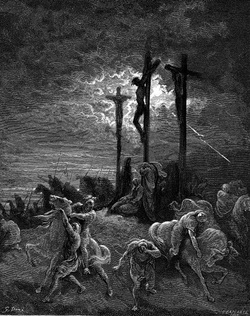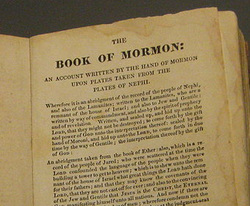 I love studying the supposed contradictions of Scripture. They're like little puzzles that God placed throughout His Word just to make it more interesting. When I was in college, I downloaded a list of over 300 contradictions, and working my way through that list was one of the most reassuring things that I've ever done. I was able to prove to myself time and time again that God's Word really is perfect in every way. Yesterday, I was confronted with another supposed contradiction, and once again, I found that God's Word is without flaw. This particular contradiction comes from II Samuel 23:8 and I Chronicles 11:11. Here is what we find in those two passages of Scripture: These be the names of the mighty men whom David had: The Tachmonite that sat in the seat, chief among the captains; the same was Adino the Eznite: he lift up his spear against eight hundred, whom he slew at one time. (II Samuel 23:8) And this is the number of the mighty men whom David had; Jashobeam, an Hachmonite, the chief of the captains: he lifted up his spear against three hundred slain by him at one time. (I Chronicles 11:11) As you can see, the first passage says that the chief of David's might men slew 800 men at one time, but the second verse says that he only slew 300 men at once. Which one is correct?
8 Comments
 The longer that I have been involved in apologetics, the more frequently I have heard Christians advising other Christians to stop quoting Bible verses in defense of the faith. The typical reason given for this advice is that atheists don’t believe the Bible to be true, and therefore, they will just ignore and ridicule those who quote Scripture at them. Unfortunately, I think that this type of reasoning robs Christians of the use of their greatest defense against the forces of evil. The Bible tells us in Ephesians 6 that we are to “stand against the wiles of the devil” by taking up “the sword of the Spirit, which is the word of God.” Most people that teach on this passage make the mistake of saying that the Bible was given to us as an offensive weapon rather than as part of the defensive armour (yes, I know that I used the British spelling), but that is not what this passage is teaching. The Bible lists the sword as part of the “whole armour of God,” and if you’ve ever watched a film with realistic sword fighting like the 1938 film The Adventures of Robin Hood starring Errol Flynn, then you should already know that a sword is used just as much for defense as it is for offense. A soldier without a sword has very little hope of surviving and absolutely no hope of being able to stand his ground.  In my last article, I explained why I believe that Mormons are not Christians. After posting that article, I received a response from a young lady named Katie who objected to some of the things that I wrote. Katie's response is available in the comment section of the previous article, but let me copy it here to save you the trouble of clicking the link: I found your blog post to be an interesting read, being a member of the Church of Jesus Christ of Latter Day Saints myself. However, there are some flaws in your argument. First, as a writer, it is untactful to pick and choose from another article rather than do the original research yourself. I highly recommend any of Mcconkie's work, and you should really quote that rather than another article as it is superfluous. It also takes away some of the credit being given to you as a writer. I have written and been published at the high school and the university level if you have more questions on this. Secondly, the doctrine of the Atonement is difficult to grasp in any religion. The mere fact that a man so perfect and so good was willing to endure such pain, misery, loneliness, and criticism for me is unfathomable. The church doctrine is that every one will have eternal life but there are different degrees of glory that everyone can obtain. Jesus died so that everyone may be saved by grace, but those with the knowledge of the truth must also be saved by their actions. Those with the knowledge of Jesus Christ and God the Father are held to a different standard than those who never had the opportunity to receive the truth. How would it be fair to hold them to the same standards simply because they were born in an area that did not have the Gospel? Thirdly, no where in your examples does it explicitly say that Christ did not die for our sins, because he did. Man is not perfect due to the fall of Adam. In order for us to return to Heaven to be with our Heavenly Father, Christ had to atone for the world's sins. This is basic Christian doctrine, and is also basic LDS doctrine. I highly recommend visiting Mormon.org. Not only are these basic questions answered, but you can also ask the missionaries questions and arrange a meeting. In the future, before you discredit a religion entirely, please do actual research, so that others may have the opportunity to discern the truth from false claims for themselves. Thank you, and have a blessed night! I wrote a reply to Katie, but it was far too long to be posted in the comment section, so I decided to post it as today's blog post instead. Here is what I wrote back to Katie:  Over the years, I have heard many reasons given by sincere Christians in an attempt to explain why Mormons are not deserving of that label. Some say that Mormons are not Christians because they do not have an accurate understanding of who God is. Others say that Mormons are not Christians because they do not have an accurate understanding of who Jesus is. Still others claim that a Mormon cannot be a Christian because he does not have an accurate understanding of the Word of God. In essence, these and almost every other reason that I have heard can be stated more simply as: Mormons are not Christians because they do not follow sound doctrine. This seems to be why most Christians reject Mormonism as a false gospel. But let's take a moment to consider the issue in light of Scripture. Does the Bible teach that we obtain salvation by following sound doctrine? Does it teach that one must have an accurate understanding of God, Jesus and the Bible in order to become a Christian? Is it even possible for us as mere mortals to have an accurate understanding of the things of God? The answer to each of these questions is, no. The Bible teaches that there is only one way to become a Christian, and it is not through adherence to a particular set of doctrines. According to the Bible, one becomes a Christian by accepting the truth of the Gospel which is spelled out for us in I Corinthians 15:3-4.  That's right. After nearly ten years, four websites and countless claims that I would never allow myself to degenerate to the status of blogger, here I am ... blogging. It's not that I have anything against bloggers. I have several friends who blog, and most importantly, my wife also has a blog. I think bloggers are wonderful people; I just couldn't bring myself to write something so ... casual. Most of the things that I write consume dozens of hours of research followed by an additional several hours of drafts, edits and rewrites before they are released to the public. That style of writing simply isn't compatible with the blogosphere, and I was not interested in changing. Yet, here I am writing the first post of my very own blog. |
Bill Fortenberry is a Christian philosopher and historian in Birmingham, AL. Bill's work has been cited in several legal journals, and he has appeared as a guest on shows including The Dr. Gina Show, The Michael Hart Show, and Real Science Radio.
Contact Us if you would like to schedule Bill to speak to your church, group, or club. "Give instruction to a wise man, and he will be yet wiser: teach a just man, and he will increase in learning." (Proverbs 9:9)
Search
Topics
All
Archives
March 2024
|


 RSS Feed
RSS Feed